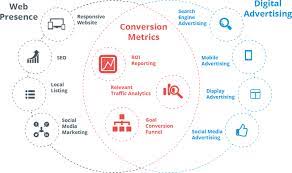The Role of Online Advertising Publishers in Digital Marketing
In the fast-paced world of digital marketing, online advertising publishers play a crucial role in connecting businesses with their target audiences. These publishers act as intermediaries between advertisers and website owners, helping to display ads on relevant platforms to reach the right consumers.
What are Online Advertising Publishers?
Online advertising publishers are platforms or individuals that provide space for displaying ads on websites, social media channels, mobile apps, and other online mediums. They work with advertisers to place targeted advertisements in front of the right audience at the right time.
Types of Online Advertising Publishers
There are various types of online advertising publishers, including:
- Display Ad Networks: These platforms connect advertisers with a network of websites to display banner ads, rich media ads, and video ads.
- Search Engines: Search engines like Google offer advertising opportunities through pay-per-click (PPC) campaigns and display ads on search engine results pages.
- Social Media Platforms: Social media sites such as Facebook, Instagram, Twitter, and LinkedIn provide advertising options to reach specific demographics and target audiences.
- Publishers’ Websites: Individual website owners monetize their sites by displaying ads from ad networks or direct advertisers.
The Role of Online Advertising Publishers
Online advertising publishers serve several key functions in digital marketing:
- Reach Targeted Audiences: Publishers help advertisers reach their desired audience based on demographics, interests, behaviour, and other targeting criteria.
- Generate Revenue: Website owners can earn revenue by displaying ads on their platforms through pay-per-click (PPC) or cost-per-impression (CPM) models.
- Optimise Ad Performance: Publishers track ad performance metrics such as click-through rates (CTR), conversions, and engagement to optimise ad placements for better results.
- Maintain Ad Quality: Publishers ensure that displayed ads meet quality standards and comply with industry regulations to provide a positive user experience.
In Conclusion
In today’s digital landscape, online advertising publishers play a vital role in facilitating effective communication between brands and consumers. By leveraging the services of these publishers, businesses can enhance their online visibility, drive targeted traffic to their websites, and ultimately achieve their marketing objectives in a competitive digital environment.
Top 5 Advantages of Online Advertising for Publishers
Top 5 Drawbacks Faced by Online Advertising Publishers
Targeted advertising
Online advertising publishers offer a valuable pro in the form of targeted advertising. By leveraging the capabilities of online advertising publishers, businesses can effectively reach specific demographics and target audiences with precision. This targeted approach ensures that marketing messages are delivered to the most relevant and receptive audience, increasing the likelihood of engagement and conversion. Through sophisticated targeting tools and strategies, online advertising publishers enable businesses to tailor their campaigns to reach the right people at the right time, maximising the impact of their marketing efforts in the digital realm.
Increased visibility
By partnering with online advertising publishers, businesses can enhance their online presence and brand awareness. Through targeted ad placements on relevant platforms, businesses can significantly increase their visibility to their target audience. This increased visibility not only helps in attracting potential customers but also strengthens brand recognition and credibility in the competitive digital landscape. Online advertising publishers play a crucial role in boosting a business’s visibility and ensuring that its message reaches the right audience at the right time, ultimately driving growth and success.
Cost-effective marketing
One significant advantage of online advertising publishers is their cost-effective marketing solutions. Publishers provide businesses with flexible pricing models like pay-per-click (PPC) or cost-per-impression (CPM), giving advertisers control over their advertising expenditure. This approach enables businesses to set budgets according to their specific needs and target audience, ensuring efficient use of marketing resources while reaching a wide online audience. By utilising these cost-effective options, businesses can maximise their return on investment and achieve their marketing goals without overspending.
Performance tracking
One significant advantage of online advertising publishers is their provision of detailed analytics and insights on ad performance. By tracking key metrics such as click-through rates, conversions, and engagement levels, publishers offer businesses valuable data to measure the effectiveness of their advertising campaigns. This performance tracking capability allows businesses to make informed decisions, refine their strategies, and allocate resources more efficiently to maximise the impact of their online marketing efforts.
Wide reach
With their wide reach, online advertising publishers offer businesses access to a diverse network of websites, social media platforms, and mobile apps. This extensive reach enables advertisers to connect with a broad audience base, ensuring that their ads are seen by a large number of potential customers across various online platforms. By leveraging the expansive reach of online advertising publishers, businesses can increase brand visibility, drive traffic to their websites, and ultimately maximise their marketing efforts in the digital realm.
1. Ad Fraud
One significant con of online advertising publishers is the prevalence of ad fraud. Ad fraud occurs when fraudulent activities such as click bots, fake impressions, or ad stacking manipulate the performance metrics of online ads. This deceptive practice not only wastes advertisers’ budgets but also skews the accuracy of performance data, making it challenging to assess the real impact of advertising campaigns. Advertisers must remain vigilant and implement measures to combat ad fraud to ensure their marketing efforts are effective and yield genuine results.
2. Ad Blocking
The growing use of ad blockers among internet users poses a significant challenge for online advertising publishers. Ad blocking software can diminish the visibility and impact of online ads that publishers place on websites and digital platforms. As more users opt to block ads, the reach and effectiveness of advertising campaigns may be compromised, leading to decreased engagement and conversion rates for advertisers. This con highlights the ongoing struggle between user experience and monetisation in the digital advertising ecosystem, urging publishers to explore alternative strategies to combat ad blocking and maintain the value of their advertising inventory.
3. Privacy Concerns
Some online advertising practices by publishers may raise privacy concerns among consumers regarding data collection and targeted advertising. With the collection of personal information for targeted ads, consumers may feel their privacy is compromised. The use of tracking technologies to gather data on browsing habits and preferences can lead to a sense of intrusion and discomfort among users. This con highlights the importance of transparency and ethical practices in online advertising to address consumer privacy concerns effectively.
4. Click Fraud
One significant drawback that online advertising publishers encounter is the issue of click fraud. Click fraud involves the manipulation of online ads through artificial clicks, leading to increased costs for advertisers without resulting in legitimate leads or conversions. This unethical practice not only undermines the effectiveness of advertising campaigns but also erodes trust between publishers and advertisers. Advertisers may unknowingly pay for fraudulent clicks, impacting their return on investment and overall campaign performance. Click fraud poses a considerable challenge for online advertising publishers in maintaining transparency and ensuring the integrity of their ad placements.
5. Ad Fatigue
One significant con of online advertising publishers is ad fatigue, which occurs when audiences are bombarded with an overwhelming number of ads from various publishers. This saturation of advertisements can lead to audience fatigue, causing a decline in engagement levels and ultimately reducing conversion rates. As consumers become desensitised to repetitive and intrusive ads, they are less likely to interact with or respond positively to the marketing messages conveyed through online advertising campaigns. Ad fatigue highlights the importance of strategic ad placement and frequency capping to prevent oversaturation and maintain audience interest and receptiveness.




